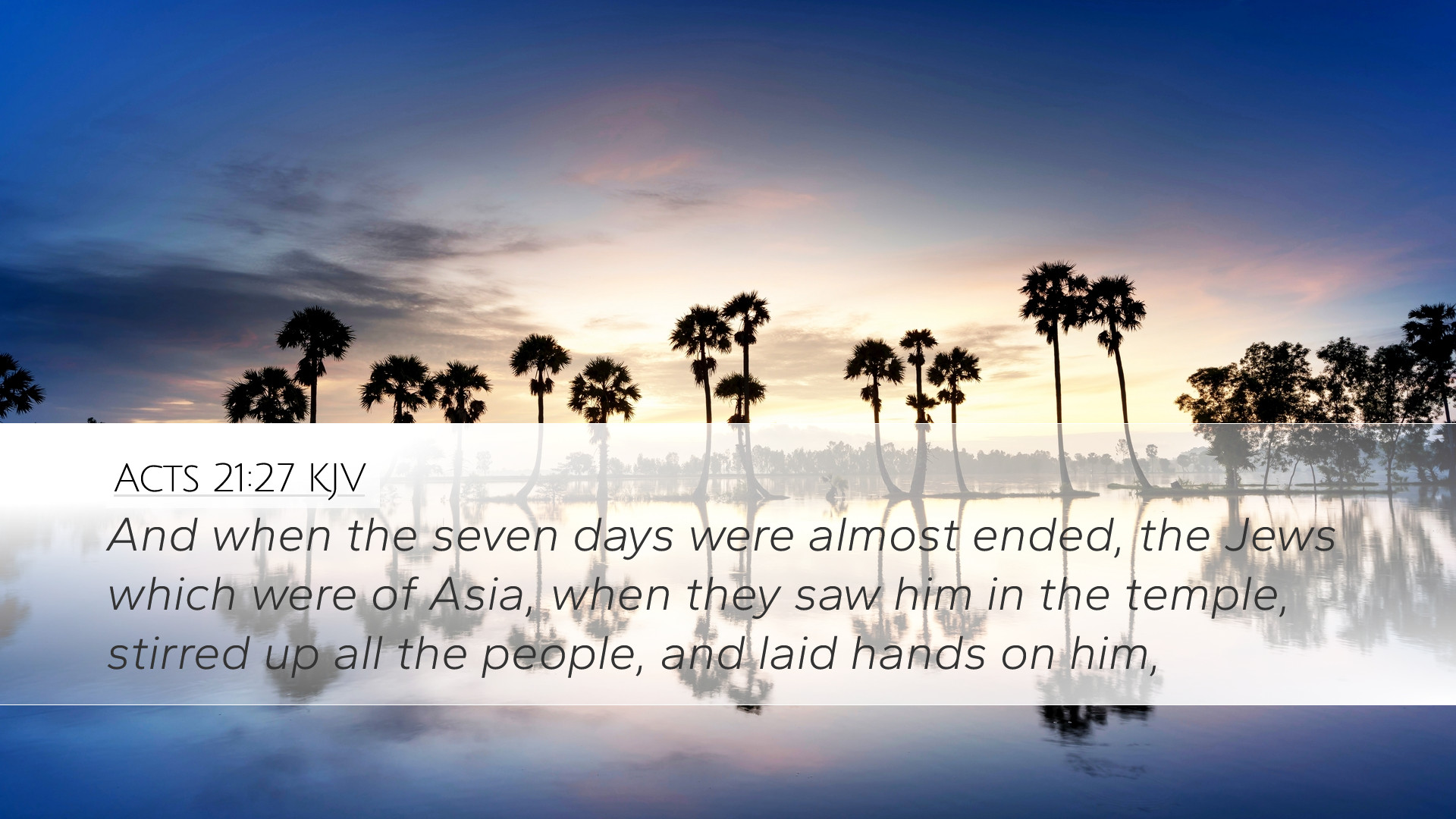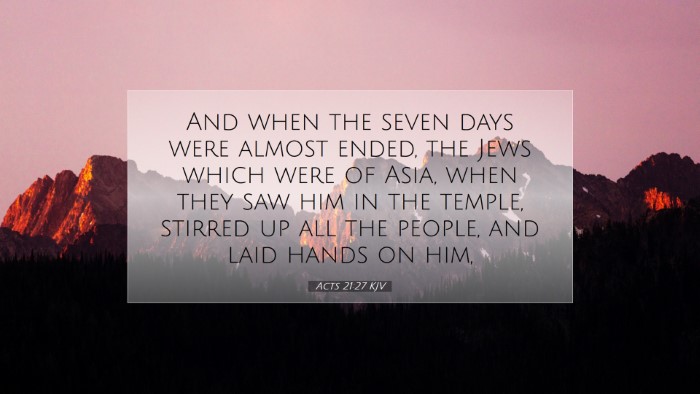Commentary on Acts 21:27
Acts 21:27 states:
"And when the seven days were almost ended, the Jews which were of Asia, when they saw him in the temple, stirred up all the people, and laid hands on him."
Introduction
This passage marks a significant moment in the Book of Acts, reflecting the tensions between early Christians and the Jewish community, particularly regarding Paul’s ministry. The unfolding events highlight not only the perilous nature of Paul’s mission but also the complexities of cultural identity in the early Church.
Historical Context
To grasp the gravity of Acts 21:27, one must consider the historical context surrounding the early Church. Paul, a prominent apostle to the Gentiles, faced persistent opposition from certain Jewish leaders who viewed his mission as a threat to the Mosaic Law and Jewish tradition.
Matthew Henry emphasizes the significance of the “seven days” mentioned, linking it to the purification rites prescribed in the Law of Moses, which signifies that Paul was still adhering to Jewish customs to some extent. This context provides insight into the dual identity Paul navigated as both a Jew and a Christian.
Verse Breakdown
In analyzing the verse, we can discern several key components:
- “When the seven days were almost ended”: This suggests a time of anticipation, where Paul was likely observed undergoing traditional purification rites. Albert Barnes points out that this timing plays a critical role in understanding the perceived infractions against Jewish law.
- “The Jews which were of Asia”: These individuals were likely from regions formerly evangelized by Paul. Their actions indicate a culmination of resentment and fear regarding Paul's teachings, suggesting they were deeply concerned about the influence of his ministry.
- “Stirred up all the people”: The phrase exemplifies mob mentality, demonstrating how quickly public opinion can be manipulated. Adam Clarke notes that this mirrors the actions against Jesus, indicating a pattern of hostility towards those who challenge established religious norms.
- “Laid hands on him”: This act signifies more than mere physical violence; it is an assertion of power over Paul, marking the beginning of his serious trials ahead. It underscores the violent opposition faced by the early Church.
Theological Insights
This verse invites deeper theological reflection:
- Persecution of the Church: The hostility Paul encounters is emblematic of the broader persecution faced by Christians. Henry articulates that such opposition often arises from fear and misunderstanding of the Church's mission.
- Faith in Adversity: Paul's unwavering commitment to his calling, even in the face of threats, reflects profound faith. Barnes posits that adherence to one’s calling, despite opposition, exemplifies true Christian discipleship.
- Cultural Tensions: The conflict highlights the challenges posed by cultural identities in the early Church. Clarke emphasizes that navigating these tensions required wisdom and grace, as both Jewish and Gentile identities played critical roles in the development of Christian doctrine.
Application for Today
This passage continues to resonate with contemporary believers:
- Courage in Witness: Like Paul, believers today are called to remain steadfast in their witness, even amidst opposition. Faithfulness to the Gospel requires courage and a clear understanding of one’s mission.
- Understanding Conflict: The tensions between cultural identities are still relevant today. Churches must find ways to navigate these complex dynamics with love and truth, seeking unity in Christ amidst diversity.
- Responding to Persecution: The narrative teaches modern believers to prepare for opposition while encouraging them to find strength in Christ. Paul’s example encourages Christians to respond to hostility with grace and understanding.
Conclusion
Acts 21:27 provides a poignant reminder of the struggles faced by early Christians and the resolve required to fulfill one’s divine calling. The insights from public domain commentaries enrich our understanding of this verse and encourage believers to draw parallels between Paul’s experiences and their own lives. In contemplating this passage, we are reminded of the enduring nature of our faith amidst trials and the call to witness boldly in a challenging world.


